Absolutely, sharks prey on squid. However, it’s not a universal truth as different species of shark feed in various ways; thus, you cannot simply assume that all sharks consume the same food.
As debate emerges on the question of which sharks consume what type of squid, it is clear that more research needs to be done.
Nevertheless, we will dive deep into the details of this fact and provide you with a captivating piece of information at the end. Don’t miss out on any part – read every word carefully and discover what surprises await!
Do Sharks Eat Squid?
Sharks are the ultimate predator of ocean life. So, certain sharks are known to consume squid as part of their regular diet. A particular species’ habitat and geographic location will determine which prey they hunt.
For example, the Shortfin Mako shark typically feeds on smaller fish and squid, while the Great White Shark is notorious for eating marine mammals such as seals and dolphins.

Squid make up an important part of many oceanic food chains and are a particularly important source of nutrition for some sharks. Due to their abundance, swift swimming capabilities, and low nutritional value compared to larger predator fish, squid is often targeted by sharks occupying the top segments of the food chain.
Sharks have evolved over millions of years to become highly efficient predators with specialized adaptations for hunting prey like squid.
These adaptations include sensory systems used to detect their prey from great distances, powerful jaws that can crush even the toughest shells, razor-sharp teeth specifically designed for tearing flesh, and even an extended gullet that allows them to swallow large prey whole.
It’s also worth noting that not all types of squid eaten by sharks are consumed alive; some species may be scavenged off dead carcasses or even collected from beaches and coral reefs during periods of low tide.
Furthermore, some sharks will only consume certain body parts of the squid they find, such as tentacles or eyes, instead of the entire organism itself — this would suggest that these animals have been conditioned through experience or instinctive behaviour to identify which components provide the most nutrition value for them.
Which Sharks Prey on Squid?
Below is a compilation of predatory sharks known for preying on squid.
Shortfin Mako Sharks:
Shortfin Mako sharks are voracious predators and are known to prey upon squid. They have long, slender bodies that enable them to move quickly and easily through the water. They are typically found in temperate and tropical waters, often in depths between 200-1000 meters.
Shortfin Makos have an impressive array of adaptations that help them to be successful predators. These include large eyes, extremely sharp teeth, and an acute sense of smell which they use to locate their prey.
Great White Sharks:
Great white sharks are also known to feed on squid and other fish, seals, dolphins, and sea turtles. They possess a streamlined bodies with strong fins, allowing them to swim long distances easily.
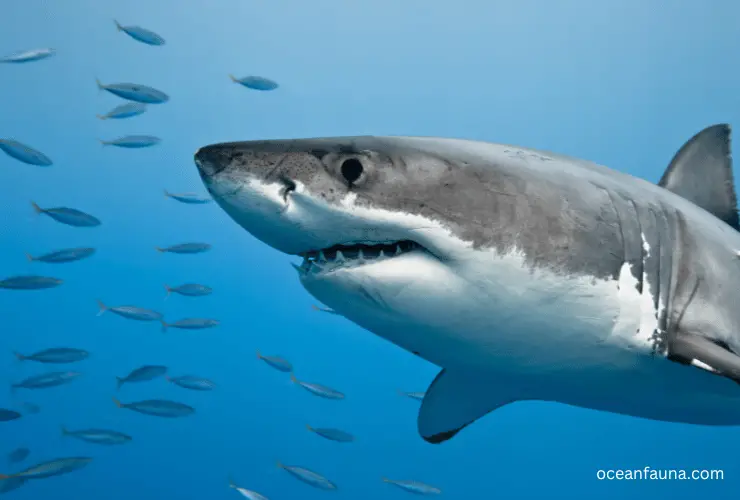
Much like the mako shark, great whites have excellent vision and can detect even faint lights from far away. Great whites are highly adapted predators with rows of razor-sharp teeth for tearing apart their prey.
Goblin Sharks:
Goblin sharks are another species that feeds on squid. These creatures inhabit the ocean’s deep waters and can reach depths of up to 1300 meters below the surface. Goblin sharks have a unique appearance due to their elongated snouts and flat heads, which help them navigate the murky deep-sea environment in search of food.
Though they possess small eyes, goblin sharks rely mostly on electroreception–the ability to sense electric fields generated by their potential prey–to locate their meals including squid which make up a significant part of their diet.
Thresher Sharks:
Thresher Sharks are also known for preying on squid in offshore waters across the globe. These sleek predators possess unusually large tails, which they use as a whip-like weapon against unsuspecting prey such as squid or fish schools hovering near the surface.
This ‘threshing’ behaviour helps the Thresher Shark stun its target before consuming it whole! Thresher Sharks live in temperate and tropical seas where they often dive into depths over 1000m in search of food sources such as squid, which constitute a major part of their diet!
Hammerhead Sharks:
Hammerhead Sharks are true global hunters, feasting on squid and fish near coral reefs or open oceans. Despite their intimidating appearance, these aquatic animals mostly consume small prey such as crustaceans and bony fish — not seals or dolphins!
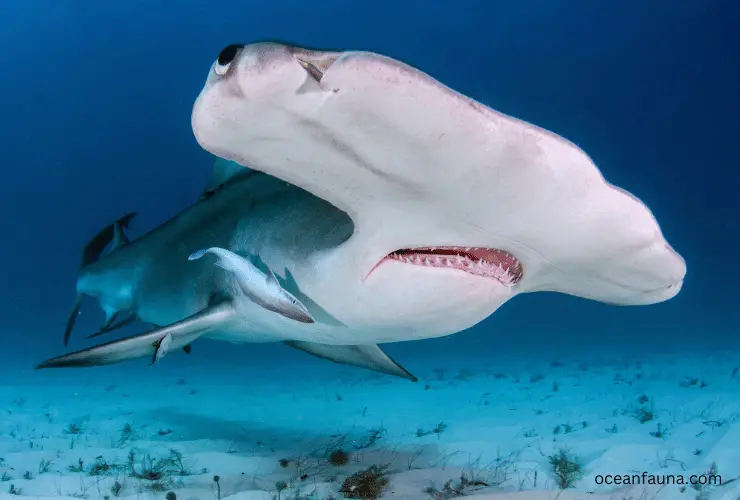
Hammerheads also have an extraordinary sense of smell which helps them locate food even in low-visibility environments, like when searching for squid!
Tiger Sharks:
Tiger Sharks, nicknamed ‘Sea Tigers,’ prowl tropical waters around the world and relish a wide variety of meals, including crustaceans, stingrays, seabirds, and carrion. In addition to their sharp vision and keen sense of smell aiding them in their hunting activities for squid prey, these powerful apex predators also have massive appetites!
Ocean White Tip Sharks:
With a taste for sea cucumbers and octopus, the Ocean White Tip Shark patrols tropical shorelines all over the globe. They aren’t afraid to chase down bigger prey like dolphins or turtles either! On top of that, they also consume smaller catches, such as squids, when conveniently located in their habitat range.
Blue Sharks:
Blue Sharks are one of the most abundant and widely distributed of all shark species. They can be found in temperate waters from the surface down to depths over 1000 meters! These predators feed on small bony fish, squid, octopus, and other marine animals such as crabs and lobsters.
Blue Sharks have a unique sense of smell that allows them to locate their prey with ease. They also possess a specialized set of teeth designed for tearing into flesh which helps them consume squid and other meals.
Bull Sharks:
Bull Sharks are found in warm, shallow waters throughout the world’s islands and continents. They typically feed on a variety of fishes, such as mackerels but will scavenge for carrion if necessary. Although they do hunt benthic creatures like squids, it is not their primary food source compared to other species like makos or tiger sharks.
In addition to these already-known sharks, a plethora of others remains largely unknown. These range from the Frilled Sharks, Sixgill Sharks, Gulper Sharks, and Kitefin Sharks to the more exotic Cookiecutter and Pygmy species – all awaiting discovery!
Which Species of Sharks Do Not Hunt and Feed on Squid?
Generally speaking, sharks are apex predators who typically hunt and feed on fish, marine mammals, squid, and other aquatic creatures. However, certain species of sharks don’t hunt and feed on squid as a primary source.
Nurse Sharks:
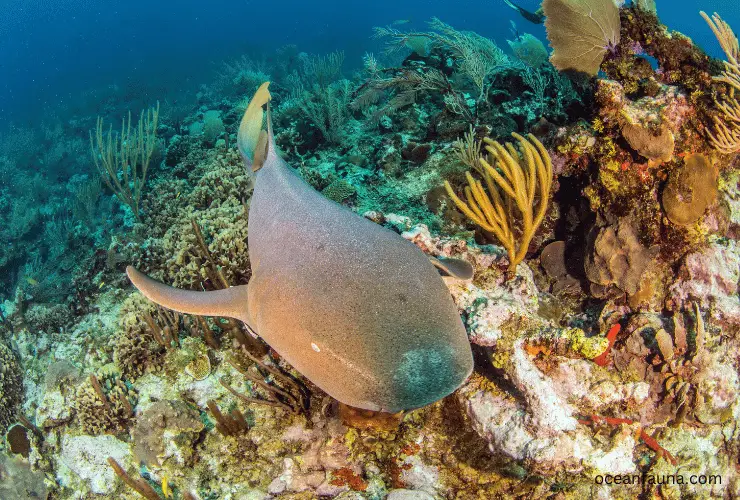
One is the Nurse Shark (Ginglymostoma cirratum), which is a bottom-dwelling shark primarily found in shallow tropical waters of the Atlantic Ocean. This species feeds mostly on benthic invertebrates such as shrimps, crabs, and molluscs. They have also been observed eating small stingrays but rarely consume squid or other fish in significant amounts.
Whale Sharks:
Another example is the Whale Shark (Rhincodon typus). Despite being one of the largest sharks in the world, this species does not actively hunt or feed on squid or other fish. Instead, they use their large mouths to filter plankton from the water column for sustenance.
This behaviour was reported by scientists as early as 1828 after observing Whale Sharks while they were swarming near a seasonally productive area off of French Guiana known as Cachalot Bank.
While individual specimens may occasionally feed upon larger prey items such as juvenile tuna or small squid, these opportunistic species mainly rely upon plankton for sustenance.
Lastly, some other species that do not actively hunt and feed on squid include angel sharks (Squatina squatina), wobbegongs (Orectolobidae family), Greenland sharks (Somniosus microcephalus), basking sharks (Cetorhinus maximus) and angelic catshark (Bythaelurus giddingsi).
All of these species live in deep waters where generalist predators like squids cannot survive due to low oxygen levels or pressure levels that are too high for them to tolerate. Furthermore, none of these species demonstrate any active hunting behavior when it comes to feeding upon squids, further validating their absence from their diets.
[Note: Sharks, mentioned in this section, very rarely consume squid. However, it does not mean they never do so.]
How Do Sharks Hunt and Prey on Squid?
Sharks typically hunt and prey on squid by using a combination of their senses. They use their keen eyesight to spot the squid’s movement in the water and their excellent sense of smell to follow scent trails given off by the squid.
Sharks also rely heavily on their lateral line system, which is a sensory organ located in their skin that can detect vibrations and pressure changes in the water. This allows them to detect and track swimming prey even in dark or murky waters.
Once they have identified and located a potential target, sharks will typically employ an ambush technique, quickly dashing out from hiding spots to surprise their prey before attacking.
Most shark species are ambush predators because they are not built for endurance swimming, so they must be able to make quick bursts of speed to capture their prey before it can escape. Depending on the species, sharks will either grab hold of the squid with their powerful jaws or use their quick reflexes to snatch it up with one bite.
Do Sharks Eat Dead Squid?
Yes, sharks do eat dead squid. This has been observed in the wild and through laboratory studies. Sharks are highly opportunistic apex predators, meaning they will take advantage of food sources that are available to them. Dead squid is one such food source that can be found in the ocean and therefore is a viable option for sharks looking for sustenance.
It has been noted that some species of shark, such as the tiger shark, can detect water-soluble odors emitted by a dead squid as far out as 500 meters away. This means that these sharks can easily find and consume dead squid without having to expend much energy searching for it. It also means that they can quickly make use of a desirable food source while it is still available.

The ability to feed on dead squid gives the shark species an additional advantage over their prey. By consuming dead squid or other carrion, sharks can gain access to essential nutrients without expending energy hunting live prey or taking risks associated with catching and killing living animals themselves.
In addition, feeding on carrion helps prevent the spread of disease by reducing contact between different species in an ecosystem.
In addition to being able to feed on dead squid, research has also shown that sharks are able to detect live squid from distances up to 1 kilometer away when using their electroreceptive organs to sense electrical fields created by their prey’s nervous systems. This means that sharks may also be able to pursue live squid more efficiently than other predators who don’t have access to this biological advantage.
Finally, research suggests that although some species of shark are more prone to feeding on carrion than others, all species have at least some interests in eating dead animals, including squid, due to its plentiful availability and easy accessibility in most marine habitats worldwide.
Do Sharks Eat Giant Squid?
Yes, sharks do eat giant squid. This has been documented in a number of studies, which have observed how sharks feed on this large cephalopod species. In fact, the giant squid is an important part of the diet of many shark species, ranging from shortfin mako sharks to white-spotted bamboo sharks.
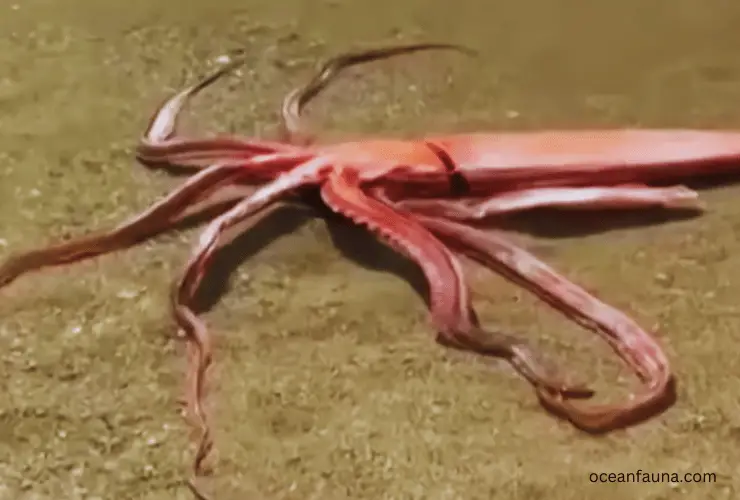
In addition to direct observations of sharks consuming giant squid, researchers have also identified the remains of a giant squid in the stomachs and digestive tracts of a variety of shark species.
For example, one study found the remains of a giant squid in the stomachs of 24% of captured white-tipped reef sharks, and another study discovered that nearly 50% of tiger sharks had consumed giant squid. These studies demonstrate that the consumption of giant squid is widespread among shark populations and underscores their importance as prey for these apex predators.
The giant squid is believed to be an ideal food source for certain kinds of sharks because they contain high levels of nutrition and energy. This makes them highly sought after by many predators, including some types of whales, dolphins, and even other large predatory fish like swordfish and tuna.
Moreover, large specimens can provide enough sustenance for several meals for larger predators like great white sharks or basking sharks. As a result, it is not surprising that sharks are keenly interested in preying upon such a nutritious creature as the giant squid.
What Nutritional Benefits Does a Shark Attain from Consuming Squid?
Most of the sharks’ diet consists of squid, which provides the predator with various nutritional advantages. Both smaller and giant squids are high in protein, which is essential for building muscle and repairing tissue. They also contain healthy fats that help to keep the sharks’ energy levels up during long swims.
Additionally, squid provides a good source of vitamins such as vitamins A, C, and E and B-complex vitamins like thiamin and riboflavin. In addition to their nutrient-dense flesh, squid also offers omega-3 fatty acids that strengthen the immune system.
Smaller squid can be an excellent source of micronutrients such as zinc, selenium, iron, and copper which are essential to maintain the health of a shark’s liver and nervous system. Squid are also rich in iodine which helps regulate metabolism rates in sharks.
The ink of certain species of squid contains melanin pigments that may provide some protection from UV radiation for shallow-water predators such as sharks.
Giant squids contain similar nutrients to smaller squid but provide larger quantities due to their size. Giant squids contain more protein than smaller species, providing fuel for long migrations or other activities requiring high amounts of energy from the shark. The large tentacles found on giant squids are filled with amino acids that support the growth of muscle tissue in predatory fish like sharks.
Additionally, giant squids contain high concentrations of sodium, which help regulate fluid balance within the shark’s body while also providing electrolytes necessary for muscular contractions when swimming at high speeds.
Overall, consuming squid provides numerous dietary advantages to sharks, including macronutrients like protein and fat, along with micronutrients like vitamins and minerals key to supporting their overall health and performance while swimming through oceans around the world.
Conclusion
As we conclude this exploration of which sharks typically feed on squid and how. And now, it’s time to share an astonishing finding: in some cases, giant squids have been known to prey upon smaller species like dogfish and baby sharks. This behaviour is contrary to the typical marine food chain—an unexpected surprise!

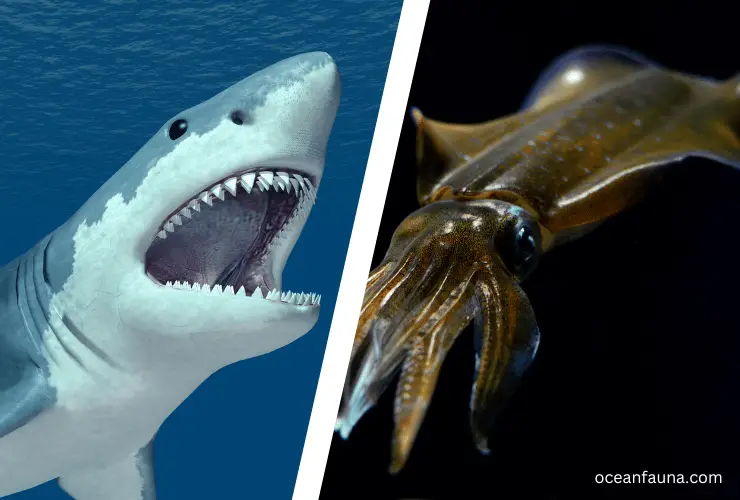
6 thoughts on “Do Sharks Eat Squid? [Explained]”